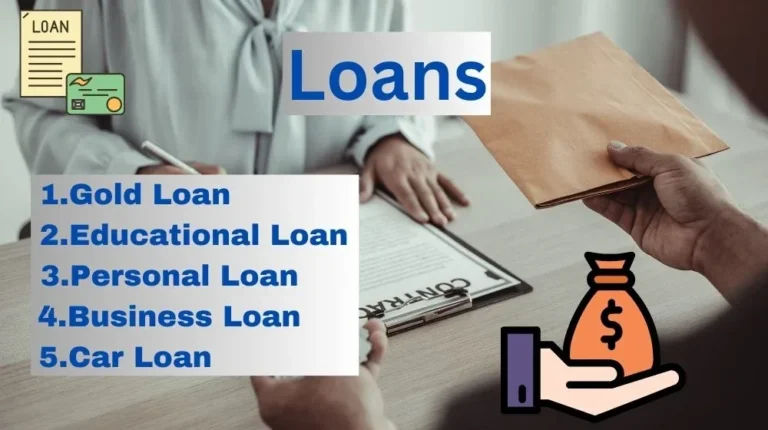Table of Contents
Complete Details about 5 top loans in this article
In the world of finance, a loan is a crucial tool that allows individuals, businesses, and institutions to access funds when needed. Loans are financial products provided by banks, non-banking financial companies (NBFCs), or other lending institutions that involve borrowing a certain sum of money with the agreement to repay it over a specified period, usually with interest.
Loans come in various types and are designed to cater to different needs. Whether you’re looking to pursue higher education, buy a home, expand a business, or simply manage a financial emergency, loans provide the flexibility and resources to help you achieve your goals.
A loan typically involves the following key elements:
- Principal Amount: The amount borrowed.
- Interest: The fee charged by the lender for borrowing the money, usually calculated as a percentage of the principal.
- Repayment Terms: The duration and method of repayment, which could range from monthly installments to lump sum payments.
- Collateral: Some loans require collateral, such as property or assets, while others (unsecured loans) do not.
Loans are available for various purposes, including personal expenses, business expansion, car purchases, education, and even home improvement projects. Each loan type comes with its unique terms, benefits, and requirements, but all share the common goal of enabling individuals or businesses to access immediate funds and pay them back over time.
Understanding how loans work, their benefits, and how to choose the right one is essential for making informed financial decisions. With this knowledge, you can confidently navigate the world of lending, ensuring you make the most out of borrowing money to support your needs while managing your financial well-being.[1]
Gold Loan: Full Guidelines in This Articles
What is a Gold Loan?

A gold loan is a secured loan where borrowers pledge their gold jewelry or coins as collateral to secure funds from a bank or non-banking financial company (NBFC). It’s one of the simplest ways to obtain a loan (gold loan auction), especially in times of emergency, and it does not require a credit score check. The loan amount depends on the value of the gold that you pledge.[2]
Interest Rate of Gold Loan
The interest rate of a gold loan is generally lower than that of unsecured loans because the loan is backed by collateral—your gold. Typically, the interest rate for a gold loan can range from 10% to 24% per annum, but it varies based on factors like:
- Loan amount: Higher loan amounts might attract lower interest rates.
- Gold purity: The purer your gold, the higher the loan amount you can get, and sometimes, a lower interest rate.
- Loan tenure: Shorter tenures tend to have slightly higher rates.
- Lender: Banks and NBFCs offer different rates.[3]
What Influences the Interest Rate on a Gold Loan?
The interest rate fluctuates based on several factors:
- Market gold price: Gold’s current market price impacts how much you can borrow, which indirectly influences the rate.
- Credit history: Though credit score is not a major deciding factor, it can influence the lender’s risk assessment.
- Lender’s policy: Different lenders have different risk appetites and offer varying interest rates.[4]
Documents Required for a Gold Loan
Applying for a gold loan is easy and quick. You’ll need the following documents:
- Proof of identity: A government-issued ID such as an Aadhar card, passport, or voter ID.
- Proof of address: Utility bills, passport, or any official document showing your residential address.
- Gold items: The actual gold that you wish to pledge.
You won’t need to provide income proof or a credit score report for a gold loan.
Process of Taking a Gold Loan
The process of taking a gold loan is straightforward:
- Visit the lender: Choose a bank or an NBFC that offers gold loans.
- Valuation: The lender will assess the purity, weight, and market value of your gold.
- Loan amount determination: Based on the valuation, the lender will offer you a loan amount, which is typically 60%-80% of your gold’s market value.
- Documentation: You’ll submit your identity and address proof.
- Disbursal: After completing the paperwork, the loan is disbursed, usually within a few hours.[5]
Eligibility for Taking a Gold Loan
A gold loan is one of the easiest and fastest loans you can apply for. It is a secured loan, meaning you offer your gold (gold jewelry, coins, or bars) as collateral to the lender in exchange for immediate funds. Since the loan is secured by your loan (gold loan auction), the eligibility criteria for a gold loan are generally more relaxed compared to unsecured gold loan franchise, such as personal loans. However, there are still some basic requirements you need to meet in order to qualify for a gold loan.
Here’s an overview of the eligibility criteria for taking a gold loan:
1. Age Criteria
- Minimum Age: Typically, the borrower must be at least 18 years old.
- Maximum Age: Most lenders allow individuals up to the age of 60 or 70 years to apply for a gold loan. The age limit can vary depending on the lender and the type of gold loan you’re applying for.
2. Type of Gold Accepted
- Gold Purity: Lenders usually accept gold jewelry, coins, or bars that have a minimum purity level of 18 karats. The higher the purity of the gold, the greater the loan amount you can get.
- Gold Quantity: The more gold you pledge, the higher the loan amount you can receive. The lender will evaluate the market value of the gold before approving the loan.
- Condition of Gold: The gold should be in good condition. If the jewelry is damaged or broken, the lender may reduce the loan amount.
3. Ownership of the Gold
The gold you pledge must be owned by you. If the gold loan franchise is not in your name or belongs to someone else, you may not be eligible for the loan (gold loan auction). In case of joint ownership, all owners of the gold must be present during the loan application process.
4. Income and Repayment Capacity
- Unlike many other loans, income proof is not a mandatory requirement for a gold loan, as it is a secured loan. The loan amount is largely determined by the value of the gold you pledge.
- However, some lenders may ask for proof of income to assess your ability to repay the loan, especially if the loan amount is high. This can include documents like salary slips, bank statements, or other income proofs.
5. Residence Proof
Lenders usually require residence proof to verify your address. Documents like a utility bill, Aadhar card, voter ID, or passport are typically accepted.
6. Credit Score (Optional)
- Since a gold loan is secured against your gold, credit history or credit score generally does not play a significant role in the approval process. Even if you have a low credit score or no credit history, you can still qualify for a gold loan.
- However, if you have a good credit score, it may help you secure a lower interest rate or better terms on your loan.
7. Loan-to-Value (LTV) Ratio
- The Loan-to-Value (LTV) ratio is the amount of money the lender is willing to lend you based on the value of your pledged gold. In most cases, lenders offer between 60% to 75% of the market value of the gold as a loan. Some lenders may offer up to 90% for specific gold loan products.
- The higher the LTV, the more money you can borrow, but it may come with a higher interest rate.
8. Guarantor (Not Usually Required)
- In most cases, a guarantor is not required for a gold loan, as the gold you pledge acts as collateral. However, some lenders may ask for one, especially for larger loan amounts.
9. Repayment Terms
- The repayment terms of a gold loan franchise can vary based on the lender’s policies. Lenders typically offer flexible repayment options such as monthly interest payments, EMI payments, or lump sum repayment at the end of the loan tenure.
- Tenure for a gold loan typically ranges from 3 months to 3 years. The loan can be renewed or extended, depending on the lender’s terms and the value of the gold pledged.[6]
FAQs
1.How much loan can I get on my gold?
You can typically get a loan of 60% to 80% of the market value of the gold pledged. The exact percentage depends on the weight, purity, and the lender’s policies.
2.Can I get a gold loan without income proof?
Yes, one of the benefits of a gold loan is that you don’t need to provide income proof or a credit score. The loan is secured against your gold.
3.What is the tenure for a gold loan?
Gold loans are usually offered with flexible tenures ranging from 3 months to 36 months. Some lenders may even offer shorter-term options.
4.Can I repay a gold loan early?
Yes, most lenders allow early repayment of the loan without any prepayment penalty. However, it’s always a good idea to check with your lender for specific terms.
5.What happens if I fail to repay my gold loan?
If you default on a gold loan, the lender can seize your gold as collateral. The lender may sell it to recover the outstanding loan amount.
Complete Details about the Educational loan
What is an Educational Loan?

An educational loan is a financial assistance provided by banks or financial institutions to students for pursuing higher education. These loans (arivu education loan) can cover tuition fees, accommodation, books, and other academic expenses. Educational loans are highly sought after as they make higher education more affordable.[7]
Benefits of Taking an Educational Loan
There are several benefits to taking an educational loan:
- No need for collateral (in some cases): You may not need collateral for loans under a certain amount.
- Tax benefits: Interest paid on education loans can be claimed under section 80E of the Income Tax Act.
- Flexible repayment terms: Repayment can start after the completion of the course or employment.
- Loan coverage: The loan covers tuition fees, living expenses, and other related costs.
Why Opt for an Educational Loan Over Other Financial Options?
- Affordable option: Educational loans usually come with lower interest rates compared to personal loans.
- Long repayment period: You have a longer time to pay it back, especially if you’re pursuing a long-term course.[8]
Process of Taking an Educational Loan
The process to apply for an educational loan involves several key steps:
- Research: Compare educational loan offers from various lenders.
- Application: Fill out the loan application form (arivu education loan) and submit the required documents.
- Loan processing: The bank evaluates the loan application based on course, university, and financial background.
- Approval and disbursal: Upon approval, the loan amount is disbursed directly to the college or university or to you.[9]
Documents Required for an Educational Loan
- Proof of identity: Aadhar card, passport, etc.
- Proof of admission: Letter of admission or offer letter from the educational institution.
- Academic records: Previous academic certificates, marksheets, and transcripts.
- Income proof: Income details of the co-applicant (typically the parent or guardian).
- Bank statements: Usually for the last 6 months to assess financial capability.
Who Can Apply for Educational Loans?
- Students: Indian nationals who have secured admission to a recognized institution.
- Co-applicant: Usually a parent or guardian who supports the loan repayment.
Educational loans can also be available for postgraduate (arivu education loan) students and professionals pursuing higher studies abroad.[10]
List of Courses Covered Under Educational Loans
Most banks provide educational loans for a wide range of courses, including:
- Undergraduate courses: Engineering, medical, law, arts, commerce, etc.
- Postgraduate courses: MBA, MS, M.Tech, medical specializations, etc.
- Vocational courses: Diploma, certification programs in technology, language, design, etc.
- Abroad studies: The loan can cover courses in foreign universities.
Educational Loan Eligibility
Eligibility criteria for educational loans depend on:
- Course type: The course must be recognized by the bank.
- Institution type: The institution should be approved by the lender.
- Age: Generally, applicants must be between 18 and 35 years of age.
- Academic qualifications: Applicants should have good academic standing.
- Repayment capacity: The financial standing of the co-applicant also matters.
FAQs
1.Can I take an educational loan for studying abroad?
Yes, educational loans are available for students wishing to study abroad. However, the loan amount and eligibility depend on the country and institution where you plan to study.
2.What is the maximum amount I can borrow with an educational loan?
The maximum loan amount varies by lender. Generally, for studies in India, the loan limit is up to Rs. 10-20 Lakhs, and for studies abroad, it can go up to Rs. 30 Lakhs or more, depending on the course.
3.What is the interest rate for educational loans?
Interest rates for educational loans typically range from 10% to 15%, but they can vary based on the lender and loan terms.
4.Can I take an educational loan without a co-applicant?
Generally, banks require a co-applicant (typically a parent or guardian) to apply for an educational loan. However, some lenders may provide loans without a co-applicant for higher amounts or specific courses.
5.Is there a moratorium period for educational loans?
Yes, most educational loans come with a moratorium period of 6 months to 1 year after course completion, during which you are not required to make repayments.
Full Detail Guidelines about Personal loan
What is a Personal Loan?

A personal loan is an unsecured loan that individuals can use for various personal reasons, such as medical emergencies, vacations, or debt consolidation. It is not secured against any collateral, which means it generally comes with higher interest rates compared to secured loans like gold loans or home loans.[11]
Documents Required for Personal Loan
For personal loans, the following documents are typically required:
- Proof of identity and address.
- Income proof: Pay slips, bank statements, tax returns.
- Employment details: Employment type and tenure.
- Credit score: A good credit score can help get better terms.
Benefits of Taking a Personal Loan
- No collateral required: Personal loans don’t require assets as security.
- Flexibility: You can use the funds for any personal need—there are no restrictions.
- Fast processing: Personal loans are often disbursed quickly.[12]
Why Opt for a Personal Loan?
Personal loans are ideal for people who need funds for personal needs but don’t have assets to pledge.
Who Can Apply for a Personal Loan?
- Individuals: Employed or self-employed individuals can apply for personal loans.
- Age group: Usually, applicants between 21 and 60 years of age are eligible.
- Good credit score: A higher credit score can improve your chances of getting approved.
Process of Taking a Personal Loan
The process of applying for a personal loan involves:
- Loan application: Submit the loan application with the necessary documents.
- Loan evaluation: Lender checks your financial history, income, and credit score.
- Approval: Once approved, the loan amount is transferred to your account.[13]
FAQs
1.How quickly can I get a personal loan?
Personal loans can be processed quickly, and disbursement often happens within 24 to 48 hours, provided you meet all eligibility criteria and submit the necessary documents.
2.What is the maximum amount I can borrow with a personal loan?
The maximum loan amount can vary depending on the lender, but it typically ranges from Rs. 50,000 to Rs. 20 Lakhs or more, based on your eligibility and income.
3.Can I take a personal loan if I have a low credit score?
It is possible, but having a low credit score (below 650) can make it harder to get approved for a personal loan. You may also face higher interest rates or a smaller loan amount.
4.What documents do I need to apply for a personal loan?
The basic documents include proof of identity, proof of address, income proof (salary slips, bank statements), and credit history.
5.Can I prepay or foreclose my personal loan?
Yes, most lenders allow prepayment or foreclosure of personal loans. However, some lenders may charge a fee for early repayment.
Complete Details about the Business loan
What is a Business Loan?

A business loan is a loan taken by businesses for purposes like working capital, equipment purchase, expansion, or operations. Business loans can either be secured (backed by assets) or unsecured (no collateral required).[14]
How to Apply for a Business Loan?
- Determine loan needs: Decide on the loan amount and purpose.
- Prepare documents: Gather financial statements, tax returns, and business registration papers.
- Submit application: Apply online or offline with the bank or NBFC.
- Approval and disbursal: After processing, the loan is sanctioned and disbursed.
Documents Required for Business Loans
- Proof of business ownership: Registration, license, etc.
- Financial statements: Balance sheets, profit & loss statements.
- Tax returns: Business-related tax returns for the last few years.
- Personal guarantees: Depending on the loan type, personal guarantees may be required.
Process of Taking Business Loans
- Research lenders: Compare business loan offers from different financial institutions.
- Apply online or in-person: Complete the loan application and submit necessary documents.
- Review and approval: Lender evaluates the application and provides a decision.
- Disbursal: Once approved, the funds are transferred to your business account.[15]
Why is a Business Loan Important?
Business loans help in expanding operations, purchasing equipment, managing cash flow, or launching new projects. Without these loans, many small businesses would struggle to grow or even sustain themselves.
Business Loan Interest Rate
Business loan interest rates depend on:
- Loan amount.
- Repayment tenure.
- Collateral offered.
- Creditworthiness.
Rates typically range from 10% to 20% annually.
FAQs
1.Can a startup apply for a business loan?
Yes, even startups can apply for business loans, although they may need to provide a solid business plan, collateral, and personal guarantees.
2.How long does it take to get approved for a business loan?
The approval process for a business loan can take anywhere from 2 weeks to a month, depending on the lender’s requirements and the type of loan.
3.Can I get a business loan without collateral?
Yes, unsecured business loans are available for small businesses that do not have assets to pledge. However, these loans typically come with higher interest rates.
4.What is the interest rate for a business loan?
Business loan interest rates can range from 10% to 25% per annum, depending on factors like loan amount, tenure, collateral, and the financial stability of your business.
5.What documents do I need to apply for a business loan?
The required documents usually include business registration details, financial statements (balance sheet, profit & loss), tax returns, and personal guarantees (in case of unsecured loans).
Complete Guidelines about the car loans
What is a Car Loan?

A car loan is a secured loan provided to individuals to purchase a new or used car. The car (agi car loan form) itself serves as collateral, meaning the lender can repossess the car (car loan dsa) if the borrower fails to repay the loan.[16]
How the Car Loan Works
- Loan application: The borrower applies for the loan.
- Approval process: The lender evaluates the applicant’s creditworthiness.
- Down payment: Borrowers typically need to make a down payment (car loan dsa), which is a percentage of the car’s cost.
- Repayment: The loan is repaid in monthly installments over a period of time.
Documents Required for Car Loans
- Proof of identity and address.
- Income proof: Payslips or tax returns.
- Car details: Make, model, year, and cost of the car.
How to Apply for a Car Loan?
The process is simple:
- Select lender: Compare offers from various lenders.
- Submit documents: Provide the necessary paperwork.
- Loan approval: After evaluation, the loan (agi car loan form) is approved, and funds are released.[17]
Eligibility for Car Loans
Eligibility criteria include:
- Age: Applicants must be between 21 and 60 years of age.
- Income: Stable income from salaried or self-employed sources.
- Credit score: A good credit score improves approval chances.
FAQs
1.Can I get a car loan for a used car?
Yes, car loans are available for both new and used cars. However, the terms and interest rates may vary depending on the age and condition of the used car.
2.What is the maximum tenure for a car loan?
The tenure for car loans typically ranges from 1 to 7 years, though the exact duration depends on the loan amount and lender’s policies.
3.What documents are required for a car loan?
You will need proof of identity, proof of address, income proof, and details of the car you wish to purchase.
4.Can I apply for a car loan if I am self-employed?
Yes, self-employed individuals can also apply for a car loan, but they may need to provide additional documents like business registration, financial statements, and tax returns.
5.Can I prepay my car loan?
Yes, most lenders allow you to prepay or foreclose the car loan, though there may be a prepayment penalty, which can vary by lender.
Conclusion
Each loan type—be it gold, education, personal, business, or car—has its distinct advantages and specific use cases. By understanding the loan process, interest rates, and eligibility criteria, you can make an informed decision that suits your needs and financial capacity.
For more information:https://paisainvests.com/



